Senior Lecturer in Occupational Therapy
Faculty of Health, Education and Society

Occupational Therapy BSc (Hons)
- Home
- Courses by subject
- Occupational Therapy BSc (Hons)
Key Facts
-
UCAS Code
B930
-
Level
UndergraduateUG BSc (Hons)
-
Duration
3 years full-time
3 years full-time extended -
Starting
September
-
BBC at A Level
DDM at BTEC -
Full Time: £9,535
-
Full Time: £16,700
-
Waterside
Updated 23/04/2025
Updated 23/04/2025
Get in touch
For questions regarding study and admissions please contact us:
UK STUDENTS ENQUIRIES
study@northampton.ac.uk
0300 303 2772
INTERNATIONAL STUDENTS ENQUIRIES
The University of Northampton’s Occupational Therapy BSc degree prepares you to work as a registered occupational therapist in the UK and overseas. Occupational Therapy is a health and social care profession that enhances the health and well-being of individuals to enable them to achieve their full potential. Occupational therapists work with people of all ages to help them overcome the challenges of everyday life resulting from illness, trauma and ageing.
Top 5 For Student Satisfaction
Our Health Professions courses (Occupational Therapy, Paramedic Science, Health Studies and Podiatry) are ranked 5th for Student Satisfaction in the Best UK University Guardian League table for 2025.
Top 24 for Occupational Therapy
The University of Northampton is the top 24th institution for Occupational Therapy courses in the Complete University Guide league tables for 2025.
Ranked 9th in Counselling, Psychotherapy & Occupational Therapy in the National Student Survey 2024
Calculations are based on Office for Students data based on the average positivity measure across all NSS questions for CAH3 taught all modes, all levels, limited to HEIs.
Successful completion of the BSc Occupational Therapy degree will allow you to apply for registration with the Health and Care Professions Council (HCPC). In addition, it will also give you an opportunity to obtain a licence to practice and become a member of the Royal College of Occupational Therapists.
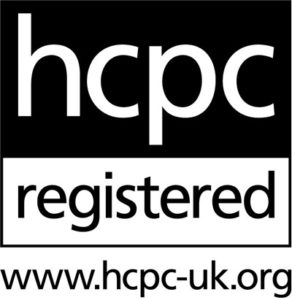
Highlights
- The Occupational Therapy degree is designed to develop innovative and pioneering occupational therapists.
- Opportunities for collaboration with local organisations to create social impact.
- A range of local, national and international professional placement opportunities.
- Modern bespoke clinical OT skills facilities located on the University’s campus.
- An established Occupational Therapist course with three key strands including: Occupation, Skills and Evidence.
- You may be eligible for financial support at the university through the NHS Learning Support Fund (NHS LSF)
- Guaranteed paid internship with the Northampton Employment Promise.
- HP laptop and software included with this course* (*Terms and conditions apply).
Entry Requirements
You will need one of the following qualifications (or equivalents):
- Three A Levels at BBC or above (in subjects other than General Studies)
- BTEC: 18 units; or Cambridge Technical graded DDM
- M at T Level
- Access: Level 3 – 15 credits at distinction and 30 at merit
- Open University minimum 60 credits.
- Please note that NVQs at any level are not accepted.
We welcome applications from students with a mix of A levels and BTEC/Cambridge Technical qualifications.
-
All Occupational Therapy BSc applicants must have:
- You will need to have five GCSEs including Maths and English at Grade C/4 or above .
You will need to provide evidence of successful recent study at degree entry level. We will also consider other recognised professional courses that are not listed above, please contact our Admissions Team to discuss this on an individual basis. Each application is considered on its own merit so if you are unsure if you have the skills, knowledge, or qualifications to apply, please contact us.
All offers of a place on the occupational therapy university programme are subject to:
- successful Occupational Health Screening,
- satisfactory Disclosure and Barring Service (DBS) report, and
- successful interview by the University.
For more information on how to make an application, please visit our How to Apply page.
If you are an International student and would like information on making an application, please see our How to Apply page.
-
All International and EU students applying for an occupational therapy course with us must meet the following minimum English language requirements:
- IELTS 7.0 (or equivalent) with a minimum of 6.5 in all bands
for study at undergraduate level
For information regarding English language requirements at the University, please see our IELTS page.
- IELTS 7.0 (or equivalent) with a minimum of 6.5 in all bands
Student Story
"My overall career goal is to become a skilled and compassionate occupational therapist to support individuals to improve their independence and quality of life. I aspire to work in a setting where I can make a real difference."
Course Content
-
The University of Northampton’s Occupational Therapy degree equips you with the knowledge and skills that you will require for professional practice through combining the study of occupational and human sciences with hands-on learning in a practical setting.
We were one of the first Occupational Therapy courses to be established in Britain. We have strong connections in the local area and offer a wide range of exciting local, national and international practical placement opportunities.
You will have an opportunity to engage in professional practice within a variety of health and social care settings across public, private, voluntary and independent sectors. The range of placements in traditional and non-traditional settings enables you to develop and advance your skills in assessment and intervention with clients. You will be encouraged to consider the evidence base for current practice throughout the Occupational Therapy course.
This degree in Occupational Therapy is delivered in three formats:
- Full-time route
- Full-time Extended route
- Apprenticeships
All the programmes are accredited by the Health and Care Professions Council and the Royal College of Occupational Therapy.
All of the University of Northampton’s Occupational Therapy BSc graduates gain an academic degree which will then allow you to apply for registration with the Health and Care Professions Council (HCPC) to obtain a licence to practice and become a member of the Royal College of Occupational Therapists.
You will be taught by qualified Occupational Therapists who also have additional teaching qualifications, Masters or PhD qualifications. Our teaching staff have a variety of clinical backgrounds and expertise from acute/community/forensic mental health, acute physical, hand therapy, neuro rehab, community social service, primary care, learning disabilities, and paediatrics.
- The Full-Time BSc Occupational Therapy degree is approximately 20 hours of direct contact plus 15 dedicated study hours per week across standard university semesters.
- The Full-Time Extended BSc Occupational Therapy course is approximately 14 hours of direct contact plus additional study hours per week, extended over 45 weeks of the year.
- The Degree Apprenticeship includes work based learning and 7 hours direct contact plus additional study hours per week, extended over 45 weeks.
Please note the modules shown here relate to the academic year 24/25. The modules relating to the academic year 25/26 will be available from June 2025.
-
-
Interprofessional Education (IPE)
Module code: FHS_IPE20Status: Compulsory
-
Exploring Professional Perspectives of Occupation (20 Credits)
Module code: OTH1127Status: CompulsoryThe purpose of this module is to introduce students to the meaning and purpose of occupation and models of occupation. Students will develop their understanding of person centred practice and occupation theory.
-
Understanding Health and Well-being (20 Credits)
Module code: OTH1128Status: CompulsoryThe purpose of this module is to enable students to understand and explore the anatomical and psychological components of the human body and mind which may contribute to everyday functional activity. Students will develop an understanding of how individuals at different life-stages function within their environments.
-
Health and Well-being: Understanding Impact on the Individual (20 Credits)
Module code: OTH1129Status: CompulsoryThe purpose of this module is to enable students to explore how daily life is affected by a range of conditions that impact health and wellbeing. Students will develop an understanding of how individuals will participate in occupations in relation to the disease process.
-
Core Skills for Occupational Therapy Practice (20 Credits)
Module code: OTH1130Status: CompulsoryThe purpose of this module is to develop a range of core skills essential to Occupational Therapy practice with a framework of a model of occupation. Students explore these skills through practical workshops within the occupational therapy specialist facilities.
-
Enabling Engagement in Occupation (20 Credits)
Module code: OTH1131Status: CompulsoryThe purpose of this module is to understand the occupational therapy process and its components. Students will build on developing core skills and applying theory to practice through the use of case studies.
-
Placement 1 (20 Credits)
Module code: OTH1132PStatus: CompulsoryThe purpose of this module is to enable the student to engage in occupational therapy practice. The module will provide the student with opportunity to develop knowledge, core skills and behaviours required for professional practice.
-
Interprofessional Education (IPE)
-
-
Exploring Evidence to Inform Practice (20 Credits)
Module code: OTH2116Status: CompulsoryThe purpose of this module is to enhance students? academic research skills through critiquing local, national and/or international evidence related to socio-cultural issues relevant to occupational therapy. Students will develop a proposal for research.
-
Exploring Inequalities and Inclusive Practice (20 Credits)
Module code: OTH2117Status: CompulsoryThe purpose of this module is to expand students thinking to consider a wide range of perspectives within occupational therapy to enhance best practice. Students will understand and be aware of inequalities and demonstrate inclusive practice.
-
Placement 2 (20 Credits)
Module code: OTH2118PStatus: CompulsoryThe purpose of this module is to enable the student to engage in occupational therapy practice. The module will provide the student with opportunity to enhance their knowledge, therapeutic skills and behaviours required for professional practice.
-
Placement 3 (20 Credits)
Module code: OTH2119PStatus: CompulsoryThe purpose of this module is to enable the student to engage in occupational therapy practice. The student will have the opportunity to develop skills in service delivery, collaborative working and leadership.
-
Principles Informing Practice (20 Credits)
Module code: OTH2120Status: CompulsoryThe purpose of this module is for students to develop their knowledge of theoretical frameworks and skills in professional reasoning. Students will consider the impact of occupational disruption which occurs through illness or disability.
-
Rehabilitation Skills (20 Credits)
Module code: OTH2121Status: CompulsoryThe purpose of this module is to develop skills in a range of occupational therapy practice settings. Students will be able to justify the selection of assessment and intervention using appropriate occupational therapy theory.
-
Exploring Evidence to Inform Practice (20 Credits)
-
-
Becoming an Autonomous Practitioner (20 Credits)
Module code: OTH3120Status: CompulsoryThe purpose of this module is to enable students to develop knowledge and a range of skills in specialist practice areas of personal interest. This module will provide students the opportunity to focus on employability skills ready for their first post. This module prepares students to become an autonomous practitioner and ready to work in a variety of practice settings.
-
Developing Creative Practice in Communities (20 Credits)
Module code: OTH3121Status: CompulsoryThe purpose of this module is to enable students? to broaden their perspectives of occupational practice. Students will evaluate current occupational therapy services and design a service which aim to meet the occupational needs within a community.
-
Placement 4 (40 Credits)
Module code: OTH3122PStatus: CompulsoryThe purpose of this module is to enable the student to engage in occupational therapy practice to become an autonomous practitioner. The module will provide the student with opportunity to consolidate knowledge, specialist skills and behaviours required for professional practice.
-
Embedding Evidence to Inform Practice (40 Credits)
Module code: OTH4106Status: CompulsoryThe purpose of this module is to enable students to use academic research to enhance current practice. Using evaluation and synthesis of local, national and/or international evidence related to socio-cultural issues relevant to occupational therapy. Students will follow a research process, participate in and evaluate, in order to present the findings of their research project.
-
Becoming an Autonomous Practitioner (20 Credits)
-
Studying the BSc Occupational Therapist degree offers you many opportunities including:
- Short Overseas Exchange: during Stage two you will have the option to take part in a student exchange programme where you can spend one week studying on the Occupational Therapy degree programme at a university in Finland. This is an excellent cultural professional exchange experience. Please note that you will have to pay for flights and accommodation.
- You are encouraged to participate in extracurricular activities during your studies such as Naidex; an annual equipment exhibition, RCOT conference or the OT Show or the many activities/courses on campus such as social entrepreneurship activities. You will be invited to take part in Heath Roadshows to promote the profession and the university, Open days and Discovery Days to contribute to the recruitment and joining of successive student cohorts.
-
The World Federation of Occupational Therapists stipulate that occupational therapy students need to complete 1,000 hours of assessed practice. You will complete four placements across the programme that will meet this requirement.
Placements are available in a variety of settings and we work closely with the students to provide a range of practice opportunities.
-
At the University of Northampton, everything we do, from funded trips to paid internships, is to give you everything you need to make a difference when you leave.
If you join our full-time Occupational Therapy degree at the University of Northampton, you will receive a laptop when your course begins*. The laptops are built to a bespoke custom specification ideal for use in the seminar room, collaborative group work or studying at home.
Whatever your ambitions, we’re here to help you to achieve them. We’ll support you to identify the skills you’re learning during your occupational therapy course, find your strengths and secure practical experience so that when it comes to applying for jobs or further study you’ll feel confident in standing out from the crowd. We’ve created the Northampton Employment Promise because we are so confident that if you focus on your studies and complete one of our awards you’ll be highly employable by the time you graduate. Putting you in a great position to secure employment or continue your studies.
To check out the full list of perks, visit our Student Perks page or dedicated International Perks page.
* UK fee payers only (see Terms and Conditions for further details)
-
What is the difference between the different routes?
We have 3 routes in the BSc (Hons) Occupational Therapy:
- Full-time (FT): students are available for teaching and self-directed study Monday to Friday for traditional university terms. Placements are full time.
- Full-time Extended (FTE): students are in university 2 full days per week, with an additional day needed for independent study. Therefore, FTE students are required to attend for more weeks of the year in order to complete all of the modules. Teaching continues into June/July for FTE students. Placements are part time (22.5 hrs) in the first 2 years, and full time in the final year.
- Apprenticeship: students are in full time employment or being recruited to an apprentice post the health and social care sector. Students are nominated for the degree by their employer, they attend university one day per week, complete work-based learning tasks and complete full time placements.
Some modules are completed with FT, FTE and apprenticeship students together. All routes are completed within 3 years.
How will I be taught on the Occupational Therapy degree?
Our occupational therapy degree incorporates a range of learning and teaching methods to engage you in active learning. This includes technology enhanced learning through online workbooks, activities and interactive discussions: classroom based learning through seminars, skills workshops, tutorials and practice–based learning. You will be a collaborator in learning with your tutors, peers and practice educators.
We are working with local partners in strategy development and are encouraging of social entrepreneurship with resources and expertise within the staff team.
How will I be assessed on the Occupational Therapy course?
A diverse range of assessments are included in the course to ensure academic and professional competence and to prepare you for the role of an Occupational Therapist. This includes written assignments, multiple choice question tests, poster presentations, group work, reflective essays, case studies, OCSE’s, Blogs and placement assessment. You may work together in pairs/small groups for some assignments.
Support is provided by tutors for all module assignments in the form of assessment tutorials and marking criteria.
What extra curricular course events or activities are there?
There are opportunities throughout the course to get involved in events and activities. We have excellent links with local organisations for volunteering. We have a strong Occupational Therapy community, the student Occupational Therapy Society arrange regular activities, we participate in National OT Week and various events throughout the year.
Worried about student finance?
Get all the info you need ahead of time, before you can apply for funding in Spring on our fees and funding pages.
Fees and Funding
2025/26 Tuition Fees
- UK Full Time: £9,535
- International Full Time: £16,700
Fees quoted relate to study in the Academic Year 2025/26 only and may be subject to inflationary increases in future years. UON will adjust UK fees annually in line with Government Policy.
-
- For placements, Occupational Therapy students may incur additional accommodation and travel costs.
- You will be provided with a uniform (three tops and three pairs of trousers). Additional uniform items can be purchased at cost.
- You will need to wear black leather shoes and black socks.
- We have a wide range of books and journals accessible in our library, either in hardback or e-books or via our electronic databases.
- You will participate in some activities where a small cost may be incurred such as craft, art, cooking material to a maximum of £25 a year.
- You are also required to complete a recognised (level two) food hygiene course You will be able to complete this course online at an approximate cost of £10-£20.
- Travel costs to and from placements, and extra costs associated with placements, may be incurred throughout your studies depending on where you are based.
-
Students, studying nursing, midwifery and many of the allied health professions courses from September 2020, may be eligible for a payment of at least £5,000 a year which they will not need to pay back. They may be able to apply for Financial support at the university through the NHS Learning Support Fund (NHS LSF) which offers eligible students additional support while studying for their degree. This is in addition to the Student Loan from the Student Loans Company.
Financial contribution towards your travel, and expenses in relation to your practice learning opportunities, may be available to you from the NHS Learning Support Fund. Details, including eligibility criteria, can be found on the NHS website.
The information provided above is correct for the academic year 2024/25 but please check the NHS LSF website for full details, any changes and updates.
For more information about possible funding options, please visit our Fees and Funding pages.
-
Fees quoted relate to study occupational therapy in the Academic Year 24/25 only and may be subject to inflationary increases in future years.
- UK – Full Time: £9,250
- International – Full Time: £16,200
Staff
Careers and Employability
Occupational Therapists work in diverse areas of practice. Opportunities are available in the UK and abroad with a wide range of career options; the National Health Service, Social Services, private practice, special education, the prison service and in the voluntary sector.
The University of Northampton’s BSc OT degree is structured to provide you with support. The final year of the course is designed to enable you to prepare for applying for your first job within the field of Occupational Therapy.
Master’s Opportunities
Our postgraduate and Master’s courses are a great way to enhance the skills you have already learnt. Benefit from our 20% alumni discount on postgraduate fees.
Related Courses
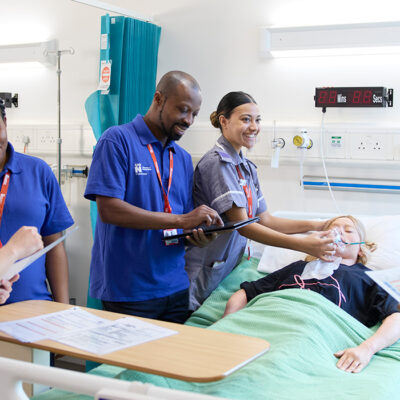
Adult Nursing BSc (Hons)
Our nursing course will give you the ability to cope with a demanding and satisfying profession...
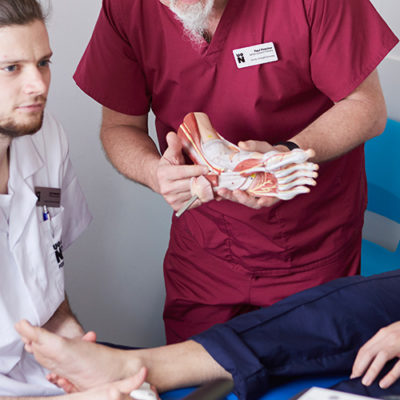
Podiatry BSc (Hons)
Our Podiatry course aims to produce graduates who are fit for practice within the NHS or...
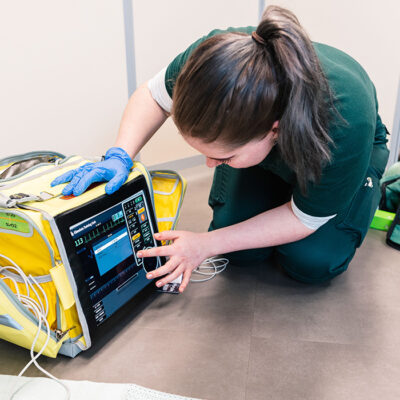
Paramedic Science BSc (Hons)
This course will provide you with the components to equip you with the required competencies to...

Nursing Associate FdSc
This is a 2 year full time FdSc with a 50/50 split between theory and practice...
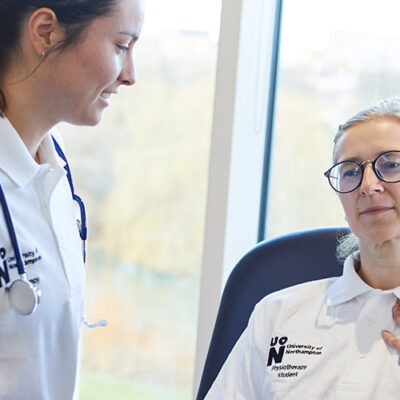
Physiotherapy BSc (Hons)
Practice-based education and research-informed prevention and management of population health. Apply now!

Learning Disability Nursing BSc (Hons)
Our course course will develop your understanding of the needs of people with learning disabilities to...








